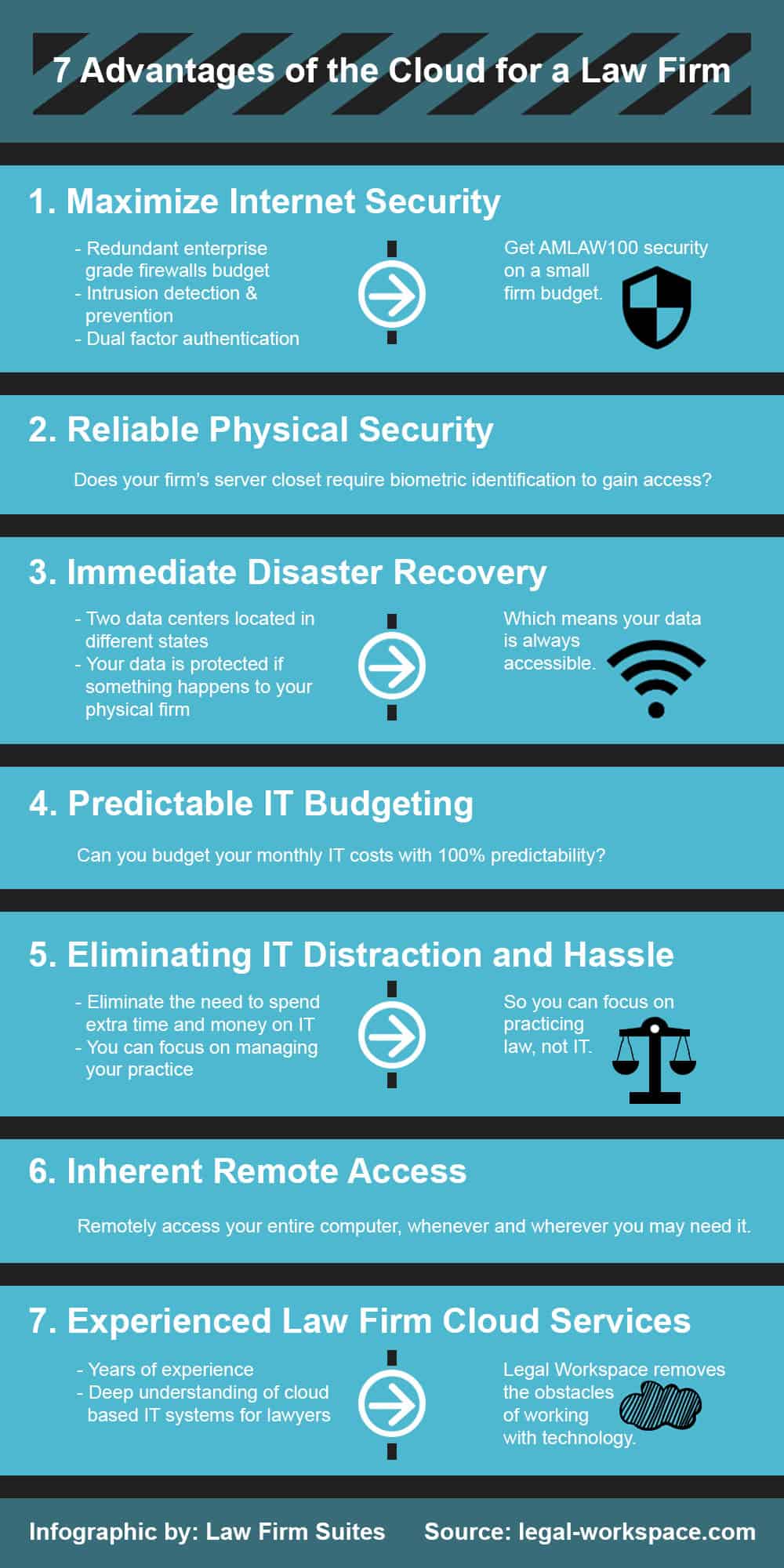Law firms make one important choice that affects numerous other aspects of their business: whether
- to set up their own IT infrastructure and house data onsite or
- use a cloud-based solution to host all of their applications and data.
Here are the seven ways in which a law firm will benefit from the cloud:
-
Maximize Internet Security
The Legal Workspace (LWS) solution has four internet providers protected by redundant enterprise-grade firewalls and an intrusion detection/prevention system that has the ability to do dual-factor authentication.
This level of security is difficult—if not impossible—to replicate in an onsite IT environment. Certainly it’s out of reach for small firms with limited budgets. As a result, many small firms end up with imperfect solutions, such as a consumer-grade firewall protecting their onsite server.
Joe Kelly, Founder and CEO of Legal Workspace, says, “We’re able to offer small law firms better internet security than most Am Law 100 firms have in place.”
-
Reliable Physical Security
Some people question the importance of physical data security. After all, if someone were to penetrate a firm’s physical defenses, they’d still need to log in to the server. But, physical security is very important: Backup media could be stolen; it’s even possible that someone could take the whole server.
LWS’s servers are located in secure data centers. To gain entry, authorized LWS employees must provide biometric identification as well as an ID card. “Only our people have the code to physically access our servers,” Kelly says.
-
Immediate Disaster Recovery
Our enterprise-grade equipment is housed in two data centers in different states. “Only our full-time employees have physical or electronic access to these redundant systems,” Kelly says. That means that if something were to happen at the data center in Colorado, our cloud services could still operate because of its intact center in Texas.
That’s one of the disadvantages of storing data in onsite servers: Should something like a fire happen onsite, a law firm would be able to eventually access its latest backup in the cloud. But, restoration could take a few weeks—which could be devastating to business.
That problem doesn’t exist if a law firm uses Legal Workspace’s cloud services. In the same situation, “They could go to any electronics store, get new laptops, log into their secure cloud environment, and they’ll be right back where they were. Even their Windows desktop is sitting in the cloud,” Kelly says. Nothing lost, no delays.
-
Predictable IT Budgeting
Technology equipment has to be depreciated over five years, but firms often have to buy the latest version of document management software or a new server every two or three years. It’s hard to anticipate what will be needed when.
LWS’s regular monthly fee means IT spend will be a known quantity with 100% predictability. And, with that monthly fee, customers automatically are upgraded to the latest versions of legal software included in the package they select.
-
Eliminate IT Distraction and Hassle
“Every law firm has to run a little IT department,” Kelly says. Even if a firm only consists of three people, the managing partner still has to spend time and energy configuring technological needs and managing vendors. A larger firm might have a full-time IT person on staff.
None of that is necessary if a firm uses our all-in-one cloud solution. For a monthly fee, all IT worries evaporate, and lawyers can get back to doing what they excel at doing: practicing law.
-
Inherent Remote Access
Typically, configuring remote access for firm lawyers and staff can be a painful experience with a lot of extra work and expense. Larger firms might need to set up a terminal server or a Citrix server cluster. Small firms might utilize a service such as GoToMyPC, which allows subscribers to access their desktop remotely for a fee.
Those options can work, but they don’t have all of the advantages of a solution like LWS. Our whole cloud system is remote: Even when lawyers are sitting in their office at a desktop, they’re accessing the files remotely when they’re logged into LWS. In other words, setting up remote access is just part of the process of working with LWS and not an extra step.
-
Experienced Law Firm Cloud Services
Hundreds of law firms that want the advantages of a cloud-based solution have been using LWS’s services for years. As a result, LWS has seen what methods and strategies work well, which means they get it done right the first time.
Kelly says, “There’s no guess work for us. We do this work over and over, and it’s all we do. We pass along the benefit of our experience to our customers.”
A cloud environment makes technology more accessible to every member of a law firm, regardless of size. But, a cloud environment like LWS does much more than that. From security to ease of use to predictability to flexibility, LWS removes the obstacles of working with technology. It renders technological issues invisible, which allows its users only to see—and benefit from—its advantages.












 Have you ever dreamed of starting your own solo practice? Thought about transitioning into semi-retirement? Looking to lower the overhead of your entire law firm? If so, you’ve probably been thwarted by the logistics and expense of finding office space, a receptionist, administrator and all the software that goes along with a successfully-run firm.
Have you ever dreamed of starting your own solo practice? Thought about transitioning into semi-retirement? Looking to lower the overhead of your entire law firm? If so, you’ve probably been thwarted by the logistics and expense of finding office space, a receptionist, administrator and all the software that goes along with a successfully-run firm.